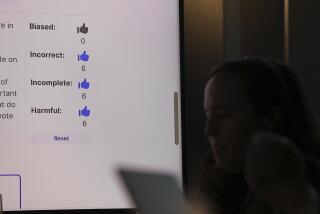A logjam of voting chatter
- Share via
“Good,” mused Twitter user Jeckles to the 131 people on the service who receive his thoughts. “I woke up this morning and Obama is still the president-elect.”
Likewise, Pastor T tweeted: “My son just walked in the door and said, ‘Dad, did you know that Barack Obama is the first not-white president?’ Yes, son, yes I do.”
LauraBooker kept it simple, “Hooray President Obama!”
I found these “tweets” (the term for any of social network Twitter’s famously terse 140-character messages) by searching the service for “President Obama” at 6 a.m. Wednesday. After plucking a few and saving them for this article, I noticed Twitter giving me a message: “599 more results since you started searching.”
Even at that early hour, the frothy river of Web chatter was still raging.
Without a doubt, the election was a high-water mark for activity on the Web. Not only did news sites see record traffic -- latimes.com had its best day ever with more than 8.2 million page views Tuesday -- but marquee new media communities such as Twitter, YouTube, Facebook and Digg hummed from morning to night. A generation of Web users was busy taking video, sharing personal stories, offering commentary and generally showing that just watching an election is no longer the optimal way to participate in one.
The ambitious “Video Your Vote” project, in which You Tube and PBS encouraged users to record and upload trips to polling places across the U.S., hauled in 1,200 submissions on Tuesday alone. As a comparison, YouTube received 5,000 recorded questions for its Republican debate feature -- but the submission window was five months long.
“It reminds you of how emotional this election is for people,” said Steve Grove, YouTube’s head of news and politics. “Some folks are just bringing their cameras along and talking about how important it is to them. It’s the first election where people can document their experiences from start to finish.” Many of the video testimonies are from first-time voters, including many African Americans, Latinos and recently nationalized citizens. Others were keeping an eye out for trouble at the voting booths. But most people, it seemed, were just keen to capture their role in a historic event.
At Twitter, Tuesday saw a kind of grass-roots watchdog effort with its Vote Report: Far-flung users sent text-based messages if they encountered voting problems, or an all-clear if their polling place had short lines. But the Vote Report channel quickly became a sprawling, many-way conversation, with hundreds of users “tweeting” to each other about every moment of the unfolding election.
“People turn to Twitter during shared, real-time events -- these debates and this election was so massively shared that Twitter benefited from huge increases in both activity and exposure,” Biz Stone, the service’s co-founder, wrote in an e-mail.
At its maximum, the total number of tweets sent every second more than doubled the previous record rate, sent during the first presidential debate, Stone noted.
If you’ll bear with me, a couple of more worthwhile statistics: Facebook, the social network that has been a leader in designing politically innovative tools, displayed a giant counter at the top of every profile page for the whole day. Every time a Facebook member clicked a button to confirm having gone to the polls, the ticker registered another number. The numbers kept climbing all day -- from 1 million, to 3 million, to 5,447,875 self-declared voters by the time the polls closed. It was the virtual equivalent of the “I Voted” sticker, many times over.
The social news site Digg .com also had the best traffic day in its nearly four-year history. A posting titled “Digg This If You Voted for Obama” became its second-most-popular story with more than 32,000 people “digging” it, and strings of comments that included messages of support from dozens of foreign countries. (Digg tends to be unabashedly liberal, to the dismay of its conservative minority.)
The sum of all these numbers is clear: Politics and the Internet have become symbiotic forces. Both thrive on personal engagement, and falter when there is none.
It’ll take more research and analysis to fully reckon whether the Internet itself boosted interest, and ultimately turnout, or if it simply enhanced the power of an inherently interesting election. Either way, the record-breaking voltage that traveled through many of the Web’s most popular communities is a nice reminder that, at its heart, democracy works best when it’s truly social.
--






